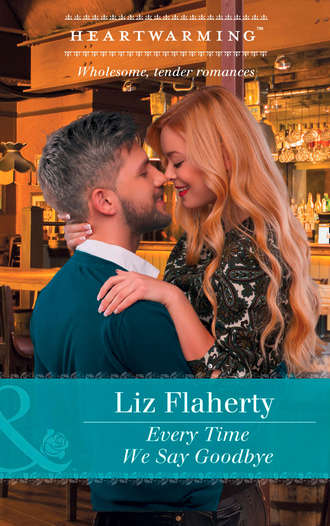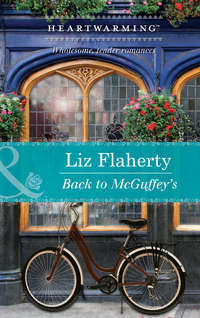
Полная версия
Every Time We Say Goodbye
His hair, curly and unmanageable when he was a boy, was straight now, still blond but streaked with brown. She’d always accused him of wearing tinted contacts because his eyes were such a bright blue. They were still spectacular, still fringed by thick lashes, but the blue had darkened and he wore glasses with wire frames. His face had been a boy’s when she saw him last, with all the softness of adolescence in it, but now his cheekbones were sharper, his jaw more square and covered with a well-trimmed beard. His build was lean, still broad shouldered and flat stomached, but more spare somehow than sixteen years before.
He wore jeans and a leather jacket that hung open over a faded blue cotton sweater. An earring glinted in his left ear, and she wondered for a suspended moment if it was the same one with his birthstone that she’d bought him for his September birthday. She’d given it to him early, before he left for college, and then she’d never seen him again.
“Jack.”
“Arlie.” He nodded, his gaze not leaving hers. “I just wanted to tell you, you don’t have to clean the Dower House. I can’t believe the lawyer’s rep asked you. Well, I can, but I’m sorry she did.” His smile was so slight it almost wasn’t there. “I also can’t believe that’s the best excuse I could come up with for coming over here this late.”
She didn’t smile back. “She didn’t ask me. She asked Rent-A-Wife, which is Gianna’s business. I just help out once in a while. Unless you no longer need our services, we’ll do the job.” Angry for a reason she couldn’t name, not to mention insulted, she started to push the door shut.
“Wait.” He stopped the door with his hand around its edge. “May I come in?” He hesitated. “Please.”
It’s time for peace in all our souls. Gianna’s voice echoed gently in Arlie’s mind. She took a deep breath and stepped back, Caruso winding around her ankles. “Sure. Go ahead and have a seat. Would you like something to drink?” She made the offer grudgingly, but she wasn’t Gianna Gallagher’s daughter for nothing.
“Do you have coffee? I know it’s late for that, but it’s tasted good all day.”
Friendly. That was how he was going to play it. Let’s just pretend the past sixteen years didn’t happen. Okay, she could do that. Sure she could. “There’s an organic market on the lake. I think everyone buys coffee there now.” She went to make a fresh pot, breathing deep when she opened the coffee canister. The scent was definitely therapeutic.
He leaned on the counter between the kitchen and the dining area. “I had supper at the Anything Goes Grill on the north end. I guess it’s new? It was good.”
“It is good. It’s nicer than the Silver Moon, although the food’s about equal on the quality scale, and it has booze.” Chris’s family had opened Anything Goes within the past year. He didn’t work in the restaurant, but he spent a lot of time there. She wondered if he’d been there tonight.
Jack looked around. “Your house looks pretty. Was it nice to come back to where you lived as a little kid?”
“It was after a while. At first, until we painted everything and put down the hardwood floors, I just kept thinking of it as the house where we lived when my mother left.” She lifted cups from the cupboard.
“Do you hear from her? Your mother?”
“No. Well, yes. At Christmastime. Usually. She’s forgotten a few.”
Arlie handed him his coffee, then filled a plate with cookies and led the way back to the living room, carrying the plate and her own mug. The cat glared at her from the seat of the recliner. “I didn’t introduce Caruso, did I? She’s my roommate.”
“What a beauty she is.” Jack had always loved cats. He set his cup on the table at the end of the couch and lifted Caruso into his arms. She leaned into him, purring politely and eyeing him adoringly with bright green eyes. “I thought Russian Blues didn’t like strangers.”
“She does. Especially males.” Although the cat wasn’t crazy about Chris. She always climbed onto her perch on the front windowsill and lay with her back to the room when he was there. Arlie wasn’t so sure Caruso’s instant adoration of Jack qualified her as a good judge of character.
When they were seated, Jack sipped from his coffee, closing his eyes for a moment in appreciation. “Rent-A-Wife?” He raised an eyebrow. “Weren’t you wearing scrubs today?”
“I’m a nurse at the hospital in Sawyer. I just help at Rent-A-Wife when Gianna needs me.” He was trying to make conversation, and she had to give him points for the effort, but she didn’t know what to say to him.
He picked up the scrapbook that lay on the couch beside him. “I remember this. You made it that last summer, didn’t you?”
She nodded, and quiet settled between them as he leafed through the heavy pages. Partway into the book, he began to ask questions. She progressed from two-word answers—“Sophomore year”—to short explanations—“No, I was grounded”—to unwilling laughter when he buried his head in his hands after seeing a picture of himself in drag during the high school production of Hairspray. After that, they laughed more, argued over things that didn’t matter and played the “do you remember?” game. At some point, it was almost as though he’d never left Miniagua. Never left her.
They were on their second cups of coffee and yet another plate of cookies when Jack reached the end of the album. He fell silent, looking at the five-by-seven studio shot of the ten of them who’d driven together to the dance. The last dance.
“Do you ever talk about it?”
She looked at where the book lay open across his lap, then up at the clench of his jaw, the set of his mouth and the tragic look in the eyes behind his glasses. She set down her cup and clasped her hands between her knees. She kept her voice quiet and steady, trying to downplay the huskiness of it. “We mention it sometimes. We say ‘the accident’ because you can’t just pretend away something that changed your life to that extent. We talk about Daddy—he was Superdad, after all.” She smiled, feeling her cheeks wobble with the effort. “But we don’t play the ‘if only’ game—at least not out loud, because it would drive us crazy.”
Jack nodded and looked at the picture again.
“Do you talk about it?” she asked gently.
“No.”
“Do you see Tucker?”
Grief darkened his eyes and stiffened his features once again. “Not often, though we’re both here now.”
She tried to imagine her life without Holly and couldn’t. “Maybe we should talk about the accident. Gianna says it’s time to let things go.” She said the words, but she didn’t mean them. She could be polite to Jack, even friendly. But she didn’t think she could quite forgive him. At least, not yet.
“How is Gianna?”
“Wonderful. She had a heart attack three years ago—that’s why I came back here to live—but she had surgery and has done great ever since.”
“Maybe I’ll get to see her.”
Arlie didn’t ask about his grandmother’s last days or her death. She was afraid if she delved too deeply into the well-being of any of the Llewellyns, she’d never be able to come out of the morass of memory again.
But there was Jack, for the first time in nearly half her life, sitting so close she could feel the warmth of him. That same warmth she’d felt before—
Before everything changed.
“I remember screaming,” she said without meaning to. “I didn’t realize no one could hear me because my larynx was injured. I wanted to comfort Holly because her foot hurt so much. Daddy wouldn’t answer us. I couldn’t find you. That’s all I remember.” There was more. But she wouldn’t go there. Couldn’t.
The prom had been the event of the school year for high school juniors and seniors. They’d rented the ballroom at the country club, having car washes and selling magazine subscriptions and candy bars to cover the expense.
Even in a high school as small as Miniagua’s, everyone knew there would be drinking at the prom, so the parents came up with the idea of hiring vans to provide transportation to the club.
Jack’s grandparents, under the auspices of Llewellyn’s Lures, owned their own limo, but Margaret said it was needed for business. This was how Arlie, Jack, Holly and Tucker ended up riding to and from the country club in the back of a twelve-passenger church van. Jesse Worth and Linda Saylors sat in front of them with Sam’s date, Cass Gentry. Sam, Nate, and Libby Worth sat behind Arlie’s father and stepmother in the front seat.
No one was particularly comfortable, and hardly any of them fastened their seat belts around their formal clothing. Arlie’s father—who always started every drive with the words “seat belts on?”—turned an unaccustomed deaf ear to the lack of clicking buckles from the backseats.
At first the girls had been embarrassed, but had joined in with the others when Dave Gallagher’s rumbling baritone and Gianna’s sweet soprano started singing “Dancing Queen.”
The next thing Arlie remembered was screaming.
“One time,” Arlie said, her throat aching, “Gianna came into Libby’s tearoom while I was cleaning. I had ‘Dancing Queen’ playing loud and my mop and I were dancing away. When I saw her face, it just killed me what I was doing to her. I went to shut it off, apologizing like mad all the way, and she just said, ‘Oh, no, honey, it’s like singing with your dad again,’ and turned it up some more. We danced through the whole song. I think I’ve played it a thousand times since then.”
Jack’s face was pale, his features set, and Arlie knew that whatever it had cost her to talk about that night, he’d paid a heavy price for listening, too.
“We’ve all healed,” she reminded him, keeping her voice level and quiet. She got up quickly, needing to move, not wanting to remember anything else about the accident and its aftermath. “More coffee?”
“Yes.” He followed her back to the counter. “The real reason I came here tonight was to apologize, but I don’t have any idea where to begin with you or with anyone else. I don’t know how to be back here. What to do when I run into Jesse or Libby or Holly. Do I say, ‘Gosh, guys, sorry my family’s limo came out on top when it did a head-on with the church van’? Or maybe, ‘Hey, look at the bright side—at least you lived’?”
His pain was palpable. She felt it on her skin, in the dryness of her eyes and the heavy beat of her heart.
“You were the only person who ever blamed you for the accident, Jack. Your father was driving the limo, not you, and he died, too. It wasn’t like your family didn’t suffer loss.”
She knew as soon as the words were out of her mouth that they were wrong. She set the coffee carafe back on its heating unit and came to lean her elbows on the bar between them. “One person blamed you, that is,” she said quietly, holding his gaze, “but I didn’t blame you for the accident. I blamed you for leaving me.”
CHAPTER TWO
LAKE MINIAGUA WAS a small community. Most of its businesses and many of its residences were named with the titles of Cole Porter songs. The prolific songwriter had grown up in nearby Peru. The Anything Goes Grill and the Silver Moon Café were the primary restaurants. A salon and spa called It’s De-Lovely was near Rent-A-Wife, Gianna Gallagher’s business. Nate’s golf course was Feathermoor. The greenhouse was Old-Fashioned Garden. The Sea Chantey Convenience Store and Bait Shop and Through Thick and Thin Barbershop filled Main Street storefronts. Even some of the wine bottles Jack had seen at Anything Goes had names like The Beguine and Midsummer Night.
On the other side of the lake, near the fishing huts and Hoosier Hills Cabins and Campground, there was a second convenience store, a Laundromat and a usually closed pizza parlor—Miniagua’s abortive attempt at a strip mall.
At the end of the business district, before the bridge that led to the golf course, the old drugstore and sundry shop sat empty. Out for a morning run, Jack slowed as he passed the brick building, looking at it with eyes both contemplative and assessing.
He thought of the evening before. Of being in the same room with Arlie and wanting to stay and stay and stay. Of talking and laughing and drinking coffee that tasted like home.
They’d talked about the past and—to a lesser degree—about the present. Jack knew Arlie worked in a nearby hospital as a nurse but that her heart was with midwifery, even if she had little opportunity to practice those skills since returning to the lake. He knew and disliked—even though he had no right to even have an opinion—that she’d dated Chris Granger for two years. She’d said she loved quilting and cooking and working with Holly on choreography for the marching band.
He’d told her he loved woodworking more than anything else he’d ever done and that even though he’d lived and worked in several states, he liked the Northeast Kingdom and thought he’d stay there for at least the foreseeable future.
But he hadn’t told her about the twelve-year-old who was the real reason Jack made Vermont his home and had done things like buy life insurance and stuff a college fund with conservative investments. The boy who’d made him understand, finally, why he’d survived the prom-night accident. Whose grandparents would drive him down from South Bend for tomorrow’s funeral.
The geeky young genius who’d made him a father.
He hadn’t mentioned Charlie. Not even once.
* * *
ARLIE HATED FUNERALS, especially when she was only there because it was the polite thing to do. She’d loved Jack Llewellyn with all her heart and soul when she was in high school. Tucker had been a great friend. But she hadn’t loved their grandmother. Not even close.
“I still don’t know why we’re here.” She pulled Gianna’s car into a parking place at the large mortuary in Kokomo. “Margaret Llewellyn didn’t like our family and we weren’t all that cracked on hers, either.” Her thoughts backtracked and it was as though she could feel Jack’s blue gaze on her. “I mean, later on, we weren’t. After the accident.”
Gianna sighed. “She and I made our peace over the years, fragile though it was. Now Jack and Tucker are back here to stay, at least for a while. Judging from what I’m hearing on the grapevine, Jack is not being treated kindly.” She patted Arlie’s cheek. “I know you welcomed him when he stopped by last night, and I’m proud of you for that. I also know how much you were hurt. I think if we make our ‘welcome back’ public, it will be a good thing.” Her dark eyes were damp, but her smile caught her stepdaughter in an aura of warmth. “I love you, Arlie.”
“You already got me here. You can stop being sniffly over me.” Arlie gave her a one-armed hug. “But I love you, too.”
The service was dignified and brief. From where she sat between Gianna and Penny Phillipy, Arlie could see Jack and Tucker in the alcove reserved for family. Tucker’s mother sat between them. A boy who appeared to be about twelve was in the chair beside Jack. Arlie wondered who he was. As far as she knew, other than his half brother, Margaret Llewellyn had been Jack’s last living relative.
Many people from the lake attended. When it was over, most of them spoke to Tucker, though there wasn’t the exchange of memories that usually took place at memorial services. No one said, “If there’s anything I can do...” or “She’s in a better place now.” No one hugged anyone. No one laughed or cried.
And hardly anyone talked to Jack. There were nods of recognition from townspeople. Sam, Nate and Jesse shook his hand. Even Jack and Tucker seemed to have little to say to each other. The boy stood between them, shaking hands when he was addressed.
The night before, when Jack had appeared at her door, Arlie hadn’t wanted to talk to him, either. Seeing other people purposefully snub him broke her heart. She turned an anxious gaze to Gianna. “Can we fix this?”
Just as her stepmother had never led her astray, she’d also never failed her when it came to knowing the right thing to do.
With Arlie in tow, Gianna walked straight to Jack. “Oh, sweetheart, we’ve missed you so.” She drew him into a hug he couldn’t have avoided if he’d wanted to. “You remember that you and Tucker are expected for dinner at the Cove tonight, don’t you?” She smiled at Tucker’s mother. “Ellen, it’s been too long. Can you come, too?”
“I can’t.” Ellen Curtis beamed at her, gratitude shining from her eyes. “I’m having dinner with other friends tonight because I’m flying back to England tomorrow, but I’m so pleased these two will be in your capable hands.”
“Yes.” Jack had to clear his throat. “Thank you, Gianna. Is it all right if I bring another guest?” He drew the slim-built boy forward, his hands resting either protectively or possessively on his shoulders. “Mrs. Gallagher, this is Charlie. My son.”
The earth didn’t move. Most of the people around them didn’t even look surprised. Of course, they were probably too busy squirming from being shamed by Gianna’s openhearted acceptance of Jack into their midst.
But Arlie couldn’t breathe.
They’d spent two hours together the night before and he hadn’t seen fit to mention a son. Or—go ahead and twist the knife—a wife. Not that being married was necessarily a prerequisite to parenthood; Jack and Tucker’s father hadn’t married either of their mothers. But the conversation the night before had been one that went well beyond the parameters of just being polite. They’d shared memories; they’d laughed. They’d talked about the accident and he’d apologized even though he hadn’t specified exactly what he was apologizing for. He’d said he didn’t know what to say to people now that he was back.
I have a son named Charlie would have been an extraordinarily good start.
* * *
“THEY DIDN’T KNOW I exist?” Charlie stood stock-still at the rear door of Tucker’s car when they finally left the cemetery after the private graveside service Margaret Llewellyn had requested. “How could they not know I exist? I’m arguably the best thing that’s ever happened to you.”
“You’re twelve years old.” Tucker stared over at his nephew in disbelief. “No one uses the word arguably when they’re still wiping their noses on their jacket sleeves.”
They did when they were Charlie, who’d skipped third grade and was well on his way to passing over the eighth, as well. He was both brilliant and funny. Neither of those traits led to appropriate behavior, which he insisted against all parental objections was part of his charm.
“Get in the car, Charlie.” Jack waited for him to obey, then closed the door behind him and got into the front passenger seat. “You know I never come back here unless I have to.”
He was still trying to process the look on Arlie’s face when he’d introduced Charlie. She had looked, for just a heartbeat in time, completely stricken. She’d paled so much that the spray of freckles on her nose had stood out in stark contrast to her skin. He’d reached to touch her, but she’d backed away a step, shaking her head slightly before turning a smile on Charlie.
Tucker looked at Jack from behind the wheel. “He’s right, you know. Other than continuing to have me for a brother whether you wanted me or not, Charlie is probably the best thing to come into your life since you walked away from the lake.”
“See?” Charlie spoke up. “Except for the brother part, Tuck’s got it.”
Jack turned enough to look at the adolescent behind him. “You know, I can probably get your grandparents to take you back to South Bend with them. They can run you over to O’Hare and put you on a direct flight tonight instead of me flying with you tomorrow afternoon. Your mother would be glad you weren’t missing another day of school.”
Charlie grinned at him, metal from his braces glinting in the afternoon sun sifting through the car window, and Jack grinned back. He could no more resist the boy, who really was the best thing in his life, than he could fly.
“We need to stop and get Gianna a bottle of wine or some flowers.” He looked out the side window of the car. The autumn colors were beautiful. “Is there anywhere on the lake or do you need to stop in Sawyer?”
“We go right past Sycamore Hill, the winery the Grangers started up a few years ago. It’s between the golf course and Jesse Worth’s vet clinic on Lake Road.”
“Chris Granger?” He’d been Jack’s age and had lived next door, but they’d never been friends. The fact that he was Arlie’s boyfriend made it fairly certain they never would be.
“Yeah.” Tucker looked over at him, his expression undecipherable. “I guess he and Arlie have been seeing each other for a long time.”
“They have.” Jack continued looking out the window, noting the colors of the leaves as they went under the canopy of trees on the stretch of road they’d always called “the tunnel.” Jesse’s place would be next, where he’d opened his clinic on the family farm, and then the winery the Grangers owned.
Arlie and Chris Granger. Even thinking about them as a couple made his insides jump around. It had been so much better not knowing. In all the time he’d been gone, he’d managed not to call her, though he’d dialed the number at Christensen’s Cove at least a thousand times. He’d thought maybe Gianna would answer and he could just ask about Arlie to make sure she was all right. But he always hung up before anyone picked up on the other end. He’d written letters all through his first two years at college, trying to explain, to make her understand. He’d never mailed any of them, but he hadn’t thrown them away, either—they were in a wooden box he’d made, stuffed into the back of his closet in his house in Vermont.
Sometime during the summer after sophomore year, he stopped dialing her number, stopped writing letters he would never mail. He started dating again, albeit without his heart in it. He and Tracy, his study partner, shared a propensity for vintage TV shows and Chicago-style hot dogs. They spent most of their evenings together.
That winter, he married her, entering into a union they later referred to as the best marriage of convenience that ever took place on the campus of Notre Dame University.
Tracy was pregnant by a man she found out too late was married. When he was running one night, Jack found her standing on a bridge over the St. Joe River. “I can’t get an abortion and I can’t jump,” she’d said, turning tear-filled eyes to him. “It’s not the baby’s fault its parents are losers.”
As much as Jack liked Tracy and enjoyed her company, there was no real attraction there. Not to mention, he believed his time to love had passed him by. He didn’t particularly want children of his own, but neither had his father—something he and Tucker had known every day of their lives.
What if this had happened to Arlie? What if she’d been alone and pregnant? She hadn’t been—they had never been intimate after the accident—but what if she had and he’d never known? He’d have wanted someone to do what was right for his child.
Life had granted him no illusions about marriage, happily-ever-after or being a proud father at someone’s graduation. But he’d hated that his father hadn’t wanted him and Tuck.
“How can I help you?” He’d wrapped his jacket around Tracy and laughed, the sound nervous. “We could get married for a while. Get you through finals and decide what you want to do.”
They’d spent the first months of their marriage studying, learning to cook without poisoning themselves, watching Matlock reruns and deciding what to do after the baby was born. Finally, eight months into Tracy’s pregnancy, they’d made the decision to release the baby for adoption and have their marriage annulled. No harm, no foul, just gratitude for getting each other through a rough time.
But then there was Charlie. In the space of time between the obstetrician saying “you can push now” and a red-faced baby squalling his head off, Jack and Tracy learned that while love had definitely complicated their pasts, it just as certainly defined their future. They had ended their marriage, but that was the only part of the plan that came together.
Jack brought his mind to the present, looking back over his shoulder to smile at the boy who’d changed his life. Who’d made him decide maybe living was worthwhile after all. Whom he was afraid to spend too much time with.







